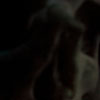
While some of Collins' works have leaned a lot into more guitar-centric sounds and traditional structures, on Tenebroso he goes for a more understated, cinematic approach. Bleak and dark, but without any trite cliché elements, the resulting disc is a wonderfully unsettling one.
Collins works heavily with silence and quiet bits throughout this album.After its initially noisy opening, "Scythe" drifts slowly into sparse piano, initially fragmented notes that slowly become more elongated and sustained into longer passages, conjuring a creeping tension until its conclusion.
"In Valleys" also leads off with practically silence, eventually coming together in a clattering mass of what sounds like far off strings and wind chimes that stays pretty open and arid throughout."What You Are Now We Used To Be" also begins in mostly quiet, like howling winds in the distance, but eventually builds to a swarm of insects, the audio equivalent of pestilence ravaging the land.
"What We Are Now You Will Be" allows for some minor bits of melodicism to come forth, cavernous resonations echoing beneath massive, sprawling tones.The closing "Devil" encompasses it all, initially a minimal, distant hum that ends up aired with an organ ringing away somewhere deep beneath the earth.It does not take long before the silence is removed, ending the disc on an especially shrill, harsh noise outburst that sounds distinctly evil.
It is almost a shame that the whole Mayan apocalypse thing did not happen, because Tenebroso would have made the perfect soundtrack for it."Tapeta Lucida" perfectly encapsulates destruction, from the rush of winds to burning fires to creaking noises like the Earth breaking apart.As far as conveying darkness, William Fowler Collins has created a work that rivals Lustmord's Heresy as a piece of captivating, but sinister audio.
samples:
 
Read More

